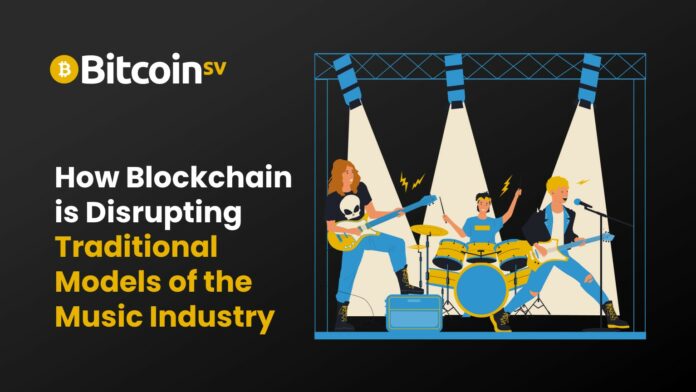The music industry, in its traditional form, has been plagued with issues, including lack of transparency and inequitable royalty distribution. This has, for a long time, shifted the power balance away from artists. However, blockchain technology, a concept popularised by Bitcoin, is positioned to disrupt this status quo and alter the music industry’s foundations dramatically.
Blockchain and Disintermediation
In the traditional model of the music industry, a complex web of intermediaries, such as record labels, publishers, and streaming services, often stands between artists and listeners. This arrangement can not only dilute the earnings of artists but can also obscure the music value chain. However, the introduction of blockchain technology offers an innovative solution to these long-standing issues: disintermediation.
The term disintermediation implies the removal of middlemen in a transactional process, paving the way for direct engagement between creators and consumers. When applied to the music industry, this establishes an immediate link between musicians and their listeners.
Blockchain-based music platforms like Opus and Blarecast are pioneering this transformation. By leveraging blockchain’s transparent and secure characteristics, these platforms can bypass traditional intermediaries, ensuring that artists are paid directly upon the purchase or stream of a song. By harnessing the power, speed, and flexibility of the Bitcoin blockchain, Blarecast has created an ecosystem that bypasses traditional intermediaries and ensures artists are paid directly when their music is streamed or purchased. In this sense, Blarecast is not only eliminating the need for middlemen but also introducing a more efficient, transparent, and equitable way for artists to monetise their work.
The impact of such disintermediation is profound. Firstly, artists can retain the majority of their earnings – as high as 90%, according to Opus – rather than seeing a substantial part of it absorbed by middlemen. Secondly, a direct artist-listener connection allows a more authentic and engaged relationship between artists and their audience, unfiltered by the influences of third-party platforms or record labels.
Equitable Royalty Distribution with Blockchain
The traditional royalty distribution system is known for its obscurity and unevenness. Blockchain technology offers a transparent and equitable solution. By deploying smart contracts, payments can be automatically distributed based on pre-agreed terms, reducing the likelihood of disputes. Platforms like Opus and Blarecast utilise blockchain for this purpose, creating a more just revenue distribution model.
Copyright Protection through Blockchain
Copyright infringement is a pressing concern within the music industry. Blockchain technology addresses this by providing a secure, immutable ledger of music ownership. Ujo, for example, offers a decentralised music ownership database, ensuring artists’ rights are protected and easily verifiable. This, in turn, significantly reduces the chances of unauthorised use and copyright disputes.
Simplifying Legal and Financial Complexities
The music industry is riddled with complex legal and financial processes, often daunting for emerging artists. Blockchain simplifies these aspects. For instance, by using smart contracts, legal obligations can be programmed and automatically executed, reducing the need for legal intermediation. Additionally, platforms like Ujo offer automatic payment splitting among collaborators, easing the financial management burden.
New Revenue Streams and Rewards for Fans
Blockchain technology also ushers in innovative revenue streams for artists. Some examples include:
- Crowdfunding: Blockchain-based platforms like eMusic allow artists to crowdfund their projects, generating revenue upfront.
- Digital collectibles: Platforms like Ujo enable artists to sell digital badges or non-fungible tokens, which fans can collect or trade.
- Music royalty investments: Startups like ANote Music allow artists to sell portions of their music royalties as investments, providing an upfront influx of capital.
Moreover, blockchain platforms can also reward fans. For instance, before dissolving, Choon rewarded listeners for curating playlists; now, Viberate offers native tokens for contributing to its database. This not only enhances the user experience but also encourages active participation in the music ecosystem.
The Bottom Line
Blockchain is disrupting the music industry by enabling disintermediation, ensuring equitable royalty distribution, providing robust copyright protection, simplifying legal and financial complexities, and creating innovative revenue streams. The shift in control and revenue back into the hands of artists has already begun. As more artists and fans embrace blockchain-based platforms, the traditional models of the music industry could be transformed entirely, fostering an environment that truly celebrates and rewards the creators of music.

























